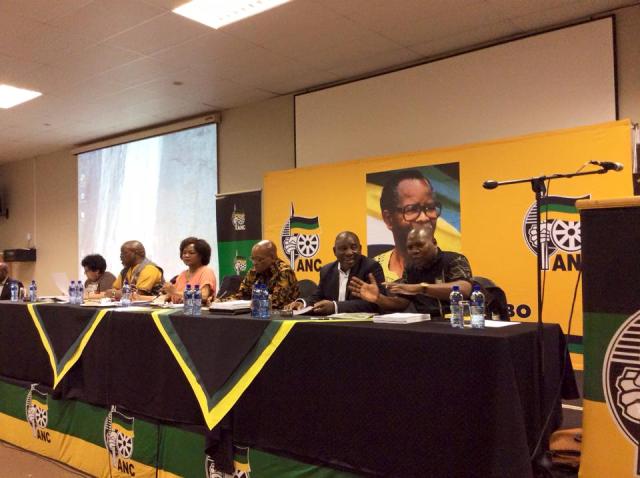 "Ramaphosa cannot be assured of victory in next year’s polls unless the ANC gets its house in order". [Photo: ANC National Executive, ANC Facebook]
"Ramaphosa cannot be assured of victory in next year’s polls unless the ANC gets its house in order". [Photo: ANC National Executive, ANC Facebook]
The phrase ‘state capture’ was chosen as word of the year by the Pan South African Language Board (PanSALB), with the term occurring 20,231 times in South African newspapers. ‘I wouldn’t be surprised if state capture becomes one of the defining words of our time,’ said Mpho Monareng, head of the PanSALB. A closely linked word also used more frequently was ‘Zuptas’, a portmanteau of the president, Jacob Zuma, and the country’s most powerful family, the Guptas. Its leading members – Ajay, Atul and Rajesh ‘Tony’ Gupta – only arrived in South Africa at the twilight of the apartheid regime in 1993 but have since accumulated fortunes that put them among the country’s very wealthiest. The Sunday Times’ Rich List in 2016 had Atul as South Africa’s seventh richest person, worth 10.7bn rand (£600m), although unravelling the Guptas’ financial dealings is far from straightforward.
This lexicographical footnote helps explain why Cyril Ramaphosa was chosen as the next leader of the ruling African National Congress in December, and hence will almost certainly succeed Zuma as president in the 2019 general elections. In a close contest, he beat the president’s ex-wife, Nkosazana Dlamini-Zuma, who was seen as likely to protect her former husband from moves to prosecute him for alleged corruption. Ramaphosa, apartheid-era union leader, ANC secretary-general and chief negotiator during the transition to democracy, was Nelson Mandela’s choice to succeed him in 1997. The rise to power instead of the technocrat exile Thabo Mbeki was a disaster for South Africa (‘Hard to imagine a more depressing contrast with … Mandela,’ the New York Times said). Mbeki was ousted by Zuma, another exile but an uneducated populist with a Zulu power base. Ramaphosa, meanwhile, went into business, accumulating a $675m fortune before returning to the political fray and becoming Zuma’s deputy president. ‘His street cred took a hit, but he has not been tainted by financial scandal,’ The New Yorker said.
Sipho Pityana, a ‘disillusioned’ ANC veteran who now chairs the mining company AngloGold Ashanti, gave a pithy description of state capture: ‘You have the head of state in your pocket … You have virtual, unfettered right to appoint and fire very senior people in government … It is a single-minded penetration of state resources.’ One alleged example was Glencore mine’s contract to supply the state power utility Eskom with coal, worth 325m rand (£20m) a year. After the Guptas took over the mine, the coal contract ballooned by about 2,000% to R7bn. Academics and the South African Council of Churches, which launched the Unburdening Panel to investigate state capture, claim the Guptas’ companies moved R40bn ($3.2bn) out of the country to Dubai over five years. A R51bn tender for locomotives for Transnet, the state rail and port monopoly, led to a cabinet reshuffle to influence the procurement, Ivor Chipkin of Wits University alleged. According to 200,000 emails made public as the #GuptaLeaks, the Transnet deal produced R5.3bn in kickbacks, the amaBhungane Centre for Investigative Journalism reported.
Unscathed
Somehow the brothers remain largely unscathed by the furore surrounding them even if some business partners do not. As the FT noted, the British public relations firm Bell Pottinger, although it ‘survived business relationships with the likes of Chilean dictator Augusto Pinochet and Syria’s Assad family, has disintegrated after getting too close to the family’. The head of the accountants KPMG, auditors of the Gupta businesses for 15 years, resigned after the firm allegedly approved the R30m cost of the wedding of the Guptas’ niece as a business expense. The four-day celebration in 2013 was perhaps when the Guptas became synonymous with the miasma surrounding Zuma. It hit the headlines over guests’ use of Waterkloof military airbase to avoid immigration formalities – ‘South Africa Outraged by Shortcut to a Wedding.’ The FT said: ‘It was a flamboyant declaration that, for the Guptas, the normal laws of South Africa did not apply.’ Tenacious digging by journalists at GuptaLeaks.com also exposed the rocket-fuelled rise of Duduzane, one of Zuma’s estimated 21 children, who went from 22-year-old intern to director of a dozen Gupta companies, accumulating a luxury Dubai flat and other perks along the way. The Guptas deny any wrongdoing and dismiss the allegations as baseless. Atul Gupta told the BBC: ‘White monopoly capital does not want us to do business in this country. They are effecting their oligopoly.’
In his first speech after being elected to head the ANC, Ramaphosa pledged to pursue ‘radical economic transformation’ and crack down on ‘corruption and abuse of office’. This will put him on a collision course with the president. Yet Zuma has survived scandals that would have sunk most politicians – from being acquitted of rape to improper use of state funds to build Nkandla, his private compound in rural KwaZulu-Natal. Zuma still faces a staggering 783 corruption charges over a 1990s arms deal. Ramaphosa cannot be assured of victory in next year’s polls unless the ANC gets its house in order. The ANC wants Zuma to step down early and he was booed at the ANC’s 106th anniversary celebrations. His government is regarded as so venal that even a loyal former ANC treasurer and provincial premier, Mathews Phosa, condemned it in remarkably caustic terms: ‘So-called leaders who trample on the people who voted them into office, who disrespect the constitution, whose only predictable response to all challenges is “racism” and who are willing to sacrifice the future of our children before the throne of a man who knows no shame and shows no character,’ he wrote in the Sunday Independent. ‘Good men cannot be silent in the face of evil. Silence is connivance.’



